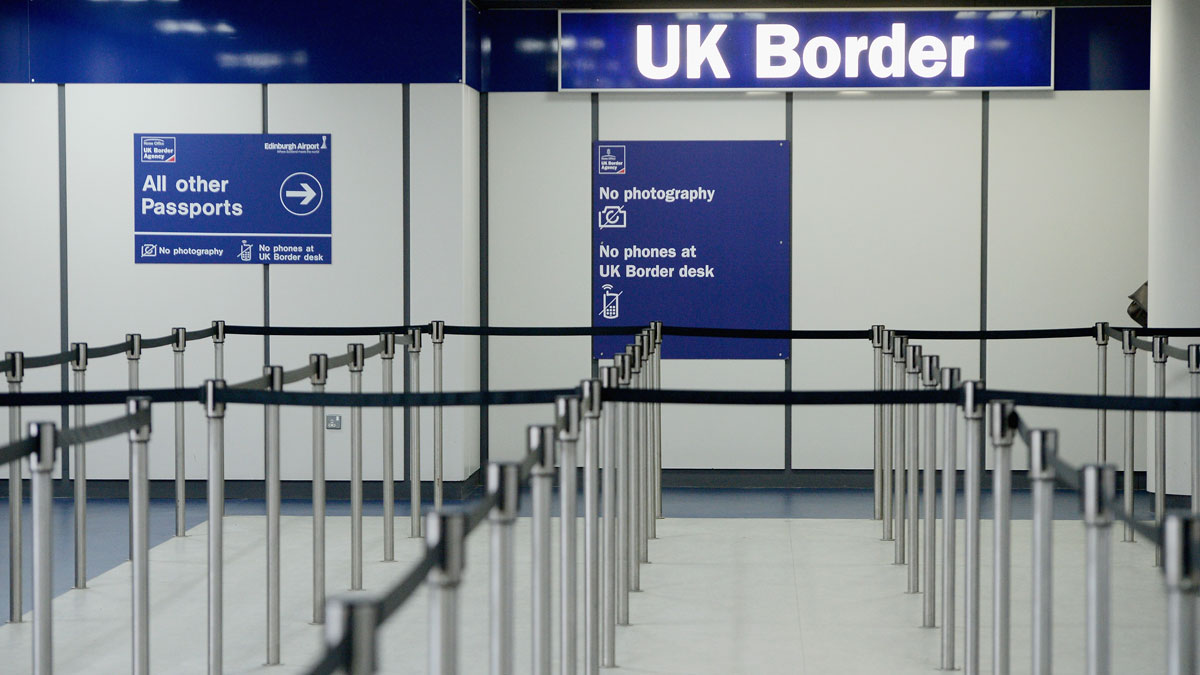The pros and cons of a points-based immigration system
Priti Patel ‘pushing for early introduction’ of Australian-style approach

A free daily email with the biggest news stories of the day – and the best features from TheWeek.com
You are now subscribed
Your newsletter sign-up was successful
A points-based immigration system could be launched two years earlier than originally planned.
Home Secretary Priti Patel will tell her cabinet colleagues that Britain should implement an Australian-style system before the end of 2020, to coincide with the end of Britain's transition period with the EU, Sky News reports.
During the general election campaign last year, the Conservatives promised to cut “overall” immigration if they were to win power.
The Week
Escape your echo chamber. Get the facts behind the news, plus analysis from multiple perspectives.

Sign up for The Week's Free Newsletters
From our morning news briefing to a weekly Good News Newsletter, get the best of The Week delivered directly to your inbox.
From our morning news briefing to a weekly Good News Newsletter, get the best of The Week delivered directly to your inbox.
Patel pledged: “We will reduce immigration overall while being more open and flexible to the highly skilled people we need, such as scientists and doctors.”
Yesterday, Boris Johnson said the UK’s post-Brexit immigration system will put “people before passports” and make the UK “able to attract the best talent from around the world, wherever they may be”.
However, there is already opposition to an accelerated introduction. The Confederation of British Industry says that companies need “at least two years to adapt to any new immigration system”.
People who want to move to and work in Australia “generally need to be pursuing an occupation that is in demand”, says the BBC. Applicants are assigned points based on a number of professional and personal characteristics, with higher points awarded for more desirable traits.
A free daily email with the biggest news stories of the day – and the best features from TheWeek.com
So what are the pros and cons of adopting a similar approach in the UK?
Pros
Increasing wages
A points-based system can “help lower immigration rates and ensure that the immigrants who do come are highly skilled and less likely to need public assistance”, according to US government-funded news agency Voice of America.
High-profile champions of this theory include President Donald Trump, who has criticised what he sees as the “very low-skill immigration system” in place prior to his election, claiming that it was “issuing record numbers of green cards to low-wage immigrants” and driving wages down.
Fairness
Michael Gove claimed in 2016 that a points-based system “is fair to everyone”, noting that Britain already operates such a scheme for non-EU migrants - although anti-EU campaigners seem “strangely unaware of its existence”, says The Guardian.
Gove added: “At the moment, we discriminate against people from outside the European Union, which is plain unfair.”
Transparency
According to an analysis of Canada’s points-based immigration system by the US Library of Congress, one of the major advantages of the system is that it is “largely transparent”, as “potential applicants can review the selection criteria to determine whether they may be able to attain sufficient points to reach the pass mark of 67 points”.
As a result, applicants arguably have a better chance of success, because they know exactly what skills they need.
Chance for the Conservatives to ‘keep their promises’
Supporters of a points-based system say such a scheme could help politicians to keep their promises on immigration, following years of failure by Tory governments to hit net migration reduction targets.
Ahead of the election, Patel shied away from giving any specific targets for her pledged immigration cut, but said the overall number would be lower if the Tories were elected.
“We will reduce immigration overall while being more open and flexible to the highly skilled people we need, such as scientists and doctors,” said Patel.
Cons
Large-scale data collection
German research institute IZA World of Labor suggests that developing a points-based system “requires large and detailed data collection on the immigration process and on immigrants’ performance over time” - a process that is “expensive” but “essential”.
“Data need to be regularly reviewed to test whether the point system is achieving its objectives or needs to be revised,” the research group says. “For example, after an evaluation in 2006 Australia in 2008 substantially reduced the ability of international students already in the country to gain permanent status.”
Might not reduce migration
It is unclear what effect Australia's skills-seeking system - which moved away from a less-selective approach almost two decades ago - has had on migrant numbers, as the country has different policies and quotas to the UK.
Australia admits about twice the number of migrants per head of existing population than the UK currently does.
In Europe, Norway and Switzerland are both outside the EU - and both have higher immigration than the UK.
System open to abuse
Former prime minister Theresa May warned her successor Boris Johnson that an Australian-style points-based system could be open to “abuse” and would not control numbers.
“I would simply urge the home secretary and the Home Office to look very carefully at the lessons that have been learned in the past in relation to points-based system, which in themselves are not an answer to controlling immigration and can allow abuse to take place,” she told the House of Commons last month.
May also said she was “a little concerned about some references to the press” to a system of “regional visas - or the ability for somebody to be given a visa if they're going to work in a particular part of the country”.
-
 The 9 best steroid-free players who should be in the Baseball Hall of Fame
The 9 best steroid-free players who should be in the Baseball Hall of Famein depth These athletes’ exploits were both real and spectacular
-
 ‘Bad Bunny’s music feels inclusive and exclusive at the same time’
‘Bad Bunny’s music feels inclusive and exclusive at the same time’Instant Opinion Opinion, comment and editorials of the day
-
 What to watch on TV this February
What to watch on TV this Februarythe week recommends An animated lawyers show, a post-apocalyptic family reunion and a revival of an early aughts comedy classic
-
 Minnesota’s legal system buckles under Trump’s ICE surge
Minnesota’s legal system buckles under Trump’s ICE surgeIN THE SPOTLIGHT Mass arrests and chaotic administration have pushed Twin Cities courts to the brink as lawyers and judges alike struggle to keep pace with ICE’s activity
-
 700 ICE agents exit Twin Cities amid legal chaos
700 ICE agents exit Twin Cities amid legal chaosSpeed Read More than 2,000 agents remain in the region
-
 House ends brief shutdown, tees up ICE showdown
House ends brief shutdown, tees up ICE showdownSpeed Read Numerous Democrats joined most Republicans in voting yes
-
 Judge slams ICE violations amid growing backlash
Judge slams ICE violations amid growing backlashSpeed Read ‘ICE is not a law unto itself,’ said a federal judge after the agency violated at least 96 court orders
-
 Businesses are caught in the middle of ICE activities
Businesses are caught in the middle of ICE activitiesIn the Spotlight Many companies are being forced to choose a side in the ICE debate
-
 Democrats pledge Noem impeachment if not fired
Democrats pledge Noem impeachment if not firedSpeed Read Trump is publicly defending the Homeland Security secretary
-
 ‘Being a “hot” country does not make you a good country’
‘Being a “hot” country does not make you a good country’Instant Opinion Opinion, comment and editorials of the day
-
 ICE: Now a lawless agency?
ICE: Now a lawless agency?Feature Polls show Americans do not approve of ICE tactics